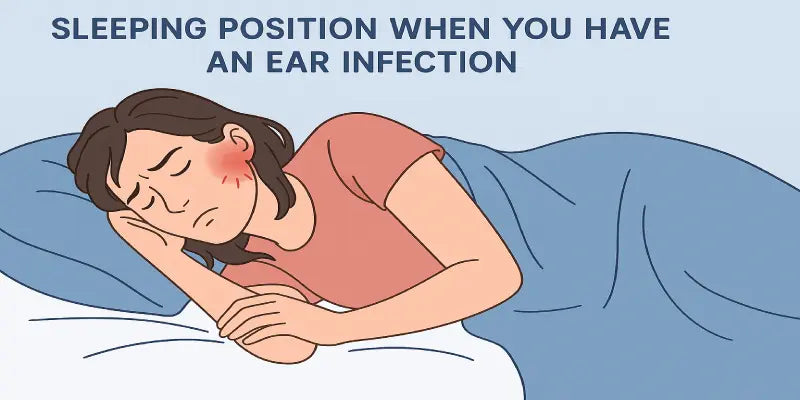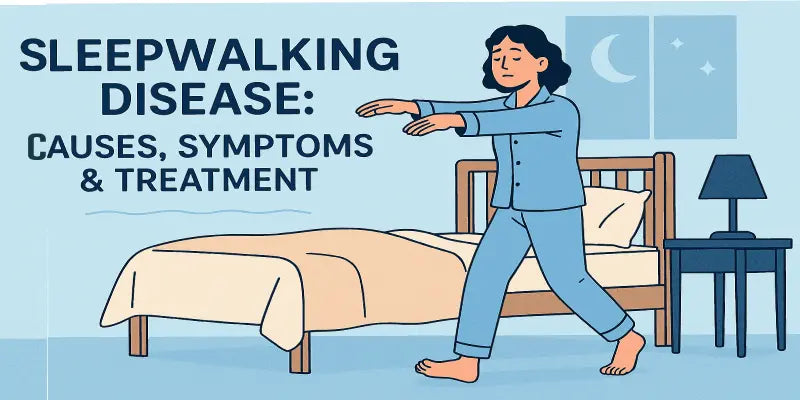
Understand How the Science of Sleep Works
We all need sleep, but have you ever wondered why or how it works? Sleep is one of the most important aspects of life, but many people take it for granted. Understanding the science of sleep can help you improve your health, productivity, and overall well-being.
In this blog, we'll learn about what sleep is, how the sleep cycle works, why we sleep, the importance of sleep stages, some common sleep disorders, and some tips to sleep better at night.
What is Sleep?
Sleep is a natural physiological process that allows your body and brain to rest. Sleep appears to be a simple concept. Most individuals simply get comfy, close their eyes, and fall asleep.
If you aren't getting enough sleep or your sleep quality is poor, you'll probably notice it just by how you feel. Without proper sleep at night, your body and brain cannot function properly.
The Sleep Cycle: How It Works
Non-REM Sleep (NRM)
This is the deeper, restorative stage of sleep. It is divided into three phases (N1, N2, and N3):
- NREM Stage 1 is the sleep cycle's lightest and shortest stage, lasting no more than five minutes. NREM Stage 1 is the transition from wakefulness to sleep, characterized by gradual declines in heart rate, respiration, muscular activity, and brain activity.
- During NREM Stage 2, commonly known as light sleep, your heart rate and body temperature decrease dramatically, and eye movements stop. This period lasts approximately 25 minutes during your first sleep cycle, however becomes longer throughout the night.
- NREM Stage 3 is regarded to be the deepest sleep stage, making you less likely to awaken than any other stage of your sleep cycle, especially in the midst of loud disturbances. The heartbeat, respiration rates, muscle movements, and brain activity all reach their lowest points.
REM Sleep (Rapid Eye Movement)
The fourth and last stage of REM sleep. During this period, brain activity increases significantly, and most of the body — except the eyes and breathing muscles — becomes temporarily paralyzed. Although dreams can occur at any stage, they are most intense during REM sleep.
As the night progresses, it is common to spend a greater percentage of time in REM sleep, with the majority of it occurring in the second half. A full sleep cycle lasts approximately 90 minutes, and you go through numerous cycles during the night. Each cycle becomes lighter as the night progresses, with REM sleep periods becoming longer approaching morning.
Why Do We Sleep?
Throughout the day, your body alternates between being awake and asleep, with some functions taking place exclusively while you are sleeping. The science of sleep is that when you sleep, your body "powers down" and most of its functions, including your brain, become less active.
Some of the important things that happen while you sleep include:
- Energy conservation and storage: Throughout the day, cells in your body consume stored resources to continue performing their functions. When you sleep, your body consumes less energy. This allows those cells to replenish and store energy for the next day.
- Self-repair and recuperation: Being less active allows your body to mend injuries and address difficulties that occurred while you were awake. That is also why being sick makes you fatigued and requires more rest.
- Brain maintenance: While you sleep, your brain reorganizes and catalogs memories as well as acquires new information. This is similar to a librarian sorting and stacking books at the end of the day. It makes it easier and more efficient to retrieve and use information you've learned and remembered.
The Importance of Sleep Stages
Each stage of sleep has a different purpose, yet all are necessary for your health.
- Deep Sleep (N3): This is when the body accomplishes the majority of its repair and regeneration. Even after a full night's sleep, you may feel physically lethargic due to a lack of deep sleep.
- REM Sleep: REM sleep is essential for cognitive processes such as learning, memory, and emotional stability. Without adequate REM sleep, you may have difficulty recalling memories or experiencing mood changes.
Both stages must be balanced for good health, and interruptions in the sleep cycle (such as waking up during deep or REM sleep) can leave you feeling fatigued.
Common Sleep Disorders
While most people can sleep well, others may suffer from sleep disorders that prohibit them from receiving the necessary rest.
Some common sleep problems are:
Insomnia
Trouble falling or staying asleep. It might be caused by jet lag, stress, worry, hormones, or intestinal issues. It could also be an indication of another disorder. Sleep insomnia can be detrimental to your general health and quality of life, potentially resulting in:
- Depression
- Difficulty concentrating
- Weight gain
- Impaired work
- Irritability
Unfortunately, sleeplessness is very prevalent. Up to half of all American adults will experience it at some point in their lives.
Sleep Apnea
Sleep apnea is defined by breathing disruptions during sleep, which generally result in poor sleep quality. This is a dangerous medical disorder that causes the body to absorb less oxygen.
Sleep apnea is classified into two types:
- Obstructive sleep apnea occurs when the flow of air is interrupted because the airway space is restricted or excessively narrow.
- Central sleep apnea occurs when there is a disturbance in the connection between the brain and the muscles that control your breathing.
Restless Leg Syndrome
Restless leg syndrome is characterized by a continual impulse to move one's legs, which is frequently accompanied by discomfort or pain. These symptoms can occur throughout the day, but they are more common at night. RLS is frequently linked to certain health disorders, such as attention deficit hyperactivity disorder (ADHD) and Parkinson's disease, but the exact cause is not always clear.
Narcolepsy Disease
Narcolepsy disease is distinguished by "sleep attacks" that occur while conscious. This implies you'll feel excessively fatigued and fall asleep unexpectedly.
This disorder can also cause sleep paralysis demon, which leaves you physically unable to move immediately after waking up. Although narcolepsy can occur on its own, it is often connected with other neurological illnesses, including multiple sclerosis.
Tips for Better Sleep
According to the science of sleep, good sleep isn’t just about the quantity, it’s also about the quality.
Here are a few tips to help you get the most out of your sleep:
Stick to a Schedule
Set aside no more than eight hours of sleep. A healthy adult should get at least seven hours of sleep each night. To be well rested, most people require no more than eight hours of sleep.
Go to bed and wake up at the same time every day, including weekends. Being consistent strengthens your body's sleep-wake cycle. If you do not fall asleep within 20 minutes of going to bed, exit your room and do something calming. Read or listen to relaxing music. If you're exhausted, go back to bed.
Pay attention to what you eat and drink
Maintain a balanced diet and avoid overeating before bedtime. Avoid heavy or substantial meals, especially within a few hours of going to bed. Discomfort could keep you awake.
Nicotine, caffeine, and alcohol should also be used with caution. Nicotine and caffeine have long-lasting stimulating effects that can interfere.
Create a Sleep-Friendly Environment
Keep your bedroom dark, chilly, and quiet to encourage deep sleep. Exposure to light in the nights may make it difficult to fall asleep. Avoid using light-emitting screens right before bedtime. Consider utilizing room-darkening shades, earplugs, a fan, or other gadgets to create a setting that meets your requirements.
Practice Relaxation
Before bed, engage in calming activities such as reading, meditation, or deep breathing to communicate to your body that it is time to relax. Try to resolve any problems or issues you have before going to bed. Write down what's on your mind, then set it aside for tomorrow. Stress management could assist. Begin with the basics, such as organizing, prioritizing, and delegating chores. Meditation can also reduce anxiety.
Conclusion
Understanding the science of sleep & how sleep works is the first step toward boosting your general health and well-being. Sleep is more than just a passive resting state; it is an active, restorative process that is essential for both physical and mental health. By prioritizing sleep and practicing some healthy sleep habits, you can wake up feeling refreshed and energized.








